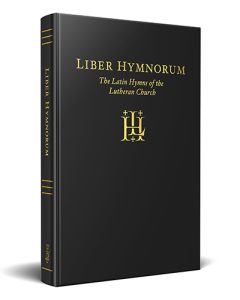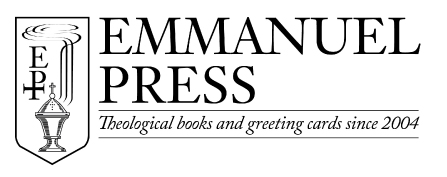 Matthew Carver: “The hymns in Liber Hymnorum are important, first, because they are the Church’s hymns. They have been used by God’s people for centuries, have stood the test of time, and have been carefully tended and passed on for the use of every generation. In them we find our own prayers, praises, and thanks to the Triune God joined with those of the saints of every age. This collection, in particular, is also important because it features the peculiar forms of the melodies as they ‘grew up’ and took on their own ‘accent’ in the bosom of the medieval church of Germany. A lot of people familiar with ancient hymns are nevertheless unaware of the rich multiplicity of ancient hymn tunes from the times before later scholars normalized, and yet sadly erased, many of these beautiful peculiarities. Thus we are at the same time given a window into the musical culture of the early Lutheran period in Germany.”
Matthew Carver: “The hymns in Liber Hymnorum are important, first, because they are the Church’s hymns. They have been used by God’s people for centuries, have stood the test of time, and have been carefully tended and passed on for the use of every generation. In them we find our own prayers, praises, and thanks to the Triune God joined with those of the saints of every age. This collection, in particular, is also important because it features the peculiar forms of the melodies as they ‘grew up’ and took on their own ‘accent’ in the bosom of the medieval church of Germany. A lot of people familiar with ancient hymns are nevertheless unaware of the rich multiplicity of ancient hymn tunes from the times before later scholars normalized, and yet sadly erased, many of these beautiful peculiarities. Thus we are at the same time given a window into the musical culture of the early Lutheran period in Germany.”
_____________
An endorsement from Dr. Robin Leaver, Visiting Professor, Yale University; Honorary Professor, Queen’s University: “Many Lutherans have forgotten – or do not know – that Latin hymns were not banished when Luther created his sturdy German hymns, but both continued side by side in the liturgical and devotional life of the early Lutheran churches. A simplistic equation has often been presented: Latin hymns are Catholic; vernacular hymns are Lutheran. But the sensitivity towards some Latin hymns was not linguistic but theological. Since the Reformation was nurtured and promoted by Latin schools, Latin hymns – corrected if necessary, as well as newly written – continued to be sung by the Latin scholars. This singing was often in alternation, with scholars singing each stanza in Latin and the parishioners following with the same stanza in German. This valuable collection, which is based on early Lutheran sources, on the one hand, witnesses to the historic Lutheran tradition of Latin hymnody, and on the other, is a practical collection of Latin hymns with English translations. The Latin hymns can be sung in seminaries and conferences where Latin is known and the vernacular versions sung from time to time in parishes. And there is also the possibility of experiencing the early Lutheran tradition of singing the alternate stanzas of a hymn in Latin and the vernacular. We are indebted to Matthew Carver for drawing our attention to this neglected liturgical tradition and for making these texts, translations, and music accessible.”

